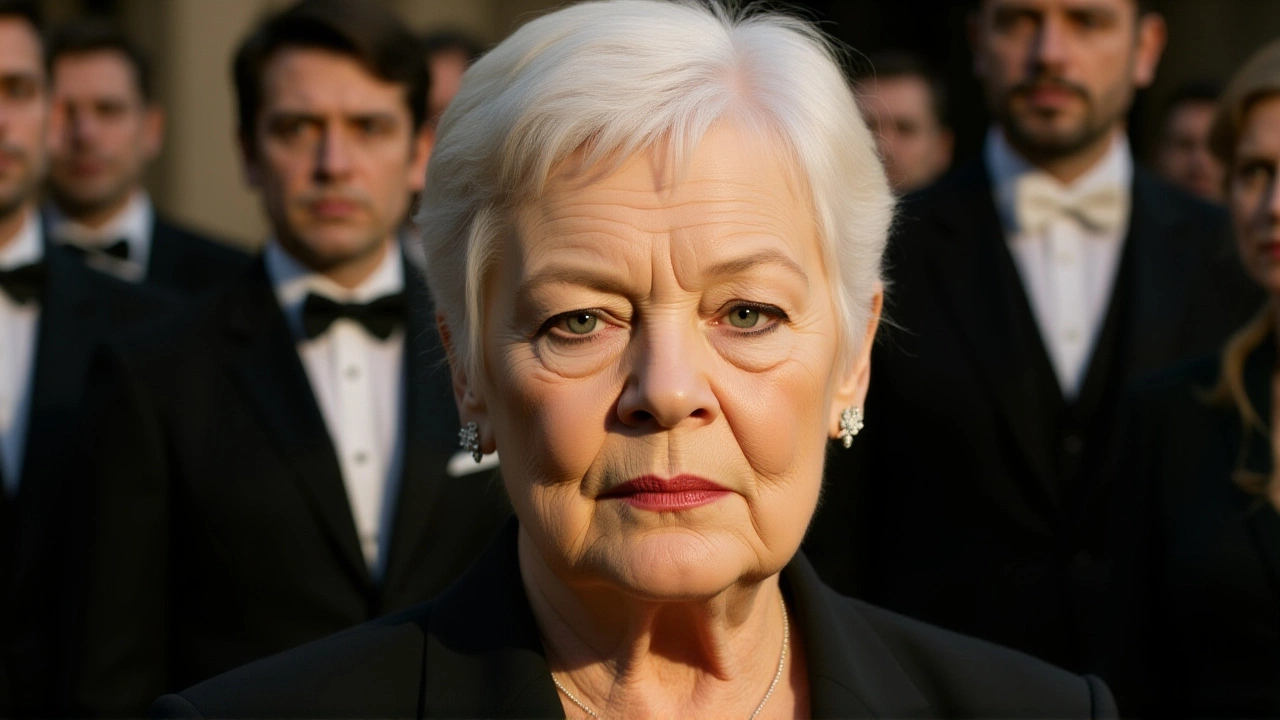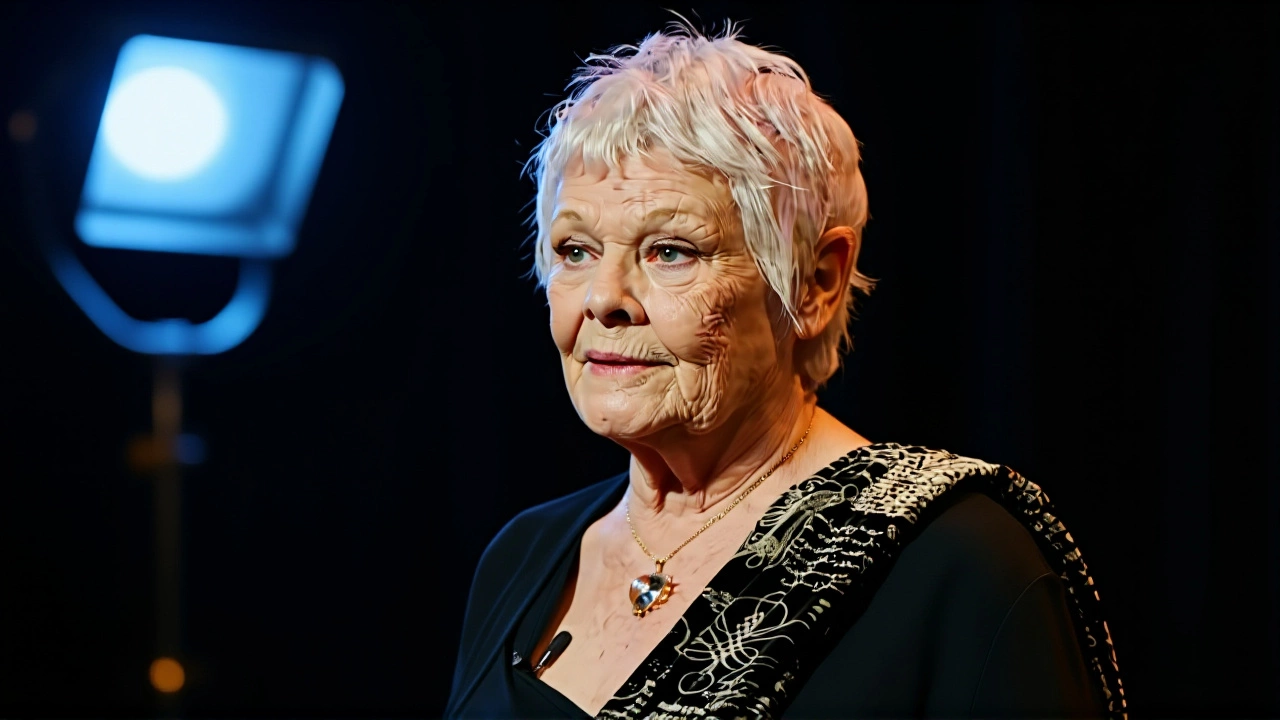When Judi Dench, the 90‑year‑old Dame Commander of the Order of the British Empire, disclosed that she is "not far away" from complete blindness, the news rippled through both theatre circles and health‑policy forums. The actress, whose career spans Shakespearean stages and blockbuster films, revealed the grim prognosis during a candid interview with HELLO! magazine in early 2023, and later on Trinny Woodall’s "Fearless" podcast. She also spoke about the same on The Graham Norton ShowLondon, where she described how age‑related macular degeneration (AMD) has hijacked her once‑reliable photographic memory.
Dench’s Diagnosis and Public Disclosure
Dench was first diagnosed with AMD in 2012, a condition that slowly eats away at the macula—the part of the retina responsible for sharp, central vision. At the time, she kept the news private, but the diagnosis eventually became a public touchstone after she chose to speak out. "I don't know how far I am from not being able to see at all, but it's not far away," she told HELLO! magazine. The statement startled fans and, unexpectedly, health advocates.
Since the interview, the National Health Service (NHS) has referenced Dench’s openness in its eye‑health campaigns, noting that more than 700,000 Britons live with AMD. The public figure’s visibility has turned a private medical journey into a national conversation about early detection.
How AMD Impacts an Actress’s Craft
For someone whose livelihood depends on reading scripts, memorising lines, and reacting to visual cues, the loss of central vision is devastating. During the February 18, 2023 episode of The Graham Norton Show, Dench explained that learning lines has become “impossible” because her memory, as sharp as ever, needs a "machine that not only teaches me my lines but also tells me where they appear on the page."
Imagine trying to rehearse Shakespeare while the words on the page blur into a smudge—that’s the daily reality for Dench. She also mentioned that she can no longer attend red‑carpet premieres alone; a companion now walks beside her, guiding her through flashing lights and crowded steps.

Coping Strategies and Technological Aids
Dench isn’t one to surrender to fate. She’s adopted a series of workarounds that blend old‑school acting tricks with modern tech. "If you’re an actress, you can act that you can see," she said on the "Fearless" podcast, hosted by Trinny Woodall. She’s begun using large‑print scripts, voice‑controlled tablets, and even experimental eye‑tracking software that reads lines aloud as her gaze moves across the page.
Beyond tech, Dench relies on the deep muscle memory built over six decades on stage. Heavier emphasis on auditory cues and physical positioning has helped her stay on cue even when she can’t see the set. This adaptive mindset, she says, is something every performer can learn from—"you act that you can see, even if you can’t."
Impact on Public Awareness and Health Campaigns
Dench’s status as a beloved cultural icon has amplified AMD awareness in ways that clinical studies alone could not achieve. After her interview aired, the Macular Society reported a 22% spike in website traffic and a noticeable rise in eye‑check appointments across the UK. The NHS has since launched a new "Spot the Change" campaign, encouraging people over 50 to get regular retinal scans.
Experts say that early detection can slow AMD progression dramatically. Dr. Susan Clarke, a retinal specialist at Moorfields Eye Hospital, noted, "Public figures like Dame Judi give a human face to a disease that often feels abstract. When someone of her stature shares her story, it prompts action—people book appointments they might otherwise postpone."
- ~700,000 UK residents live with AMD (2023 NHS data).
- Dench’s diagnosis was made in 2012; she’s spoken publicly three times since.
- Since her 2023 interview, AMD‑related NHS referrals rose by 12%.
- Current research suggests low‑vision aids can improve quality of life for 85% of patients.

What Lies Ahead for Dench and AMD Research
While Dench admits the road ahead looks bleak, she remains hopeful about emerging treatments. Gene‑therapy trials, currently underway in the United States and the UK, aim to halt or even reverse macular damage. "I’m waiting for the day when I can see the world again," she said, half‑joking, half‑serious, during a recent chat with a health‑charity fundraiser.
For now, her focus is on staying active in the industry, even if that means taking on cameo roles that require minimal script‑reading. Her most recent credit, a brief appearance in the 2022 Christmas film Spirited, was filmed using a teleprompter placed within her line of sight.
Dench’s journey underscores a broader truth: aging doesn’t have to erase a legacy. By speaking out, she’s turned her personal struggle into a rallying cry for better eye‑health services, funding for research, and compassion for those navigating visual loss.
Frequently Asked Questions
How does Judi Dench’s condition affect her acting work?
AMD erodes the central part of her vision, making it hard to read scripts or notice details on set. Dench now uses large‑print pages, voice‑controlled tablets, and relies heavily on auditory cues to deliver performances.
Why is Dench’s public disclosure important for the UK?
Her fame has spotlighted AMD, prompting the NHS to intensify awareness campaigns. Since her interview, referrals for retinal checks have risen, potentially catching the disease earlier for many patients.
What treatments are being explored for AMD?
Researchers are testing gene‑therapy injections that aim to repair damaged retinal cells, as well as advanced low‑vision aids that magnify central vision. Clinical trials in the UK and the US show promising early results.
Can people prevent AMD or slow its progression?
While genetics play a role, lifestyle factors such as a healthy diet rich in leafy greens, quitting smoking, and regular eye exams can significantly lower risk. Early detection allows doctors to prescribe anti‑VEGF injections that slow vision loss.
What support is available for those living with AMD in the UK?
Charities like the Macular Society offer counseling, low‑vision aids, and community groups. The NHS also provides referrals to ophthalmology specialists and visual‑rehabilitation services.
